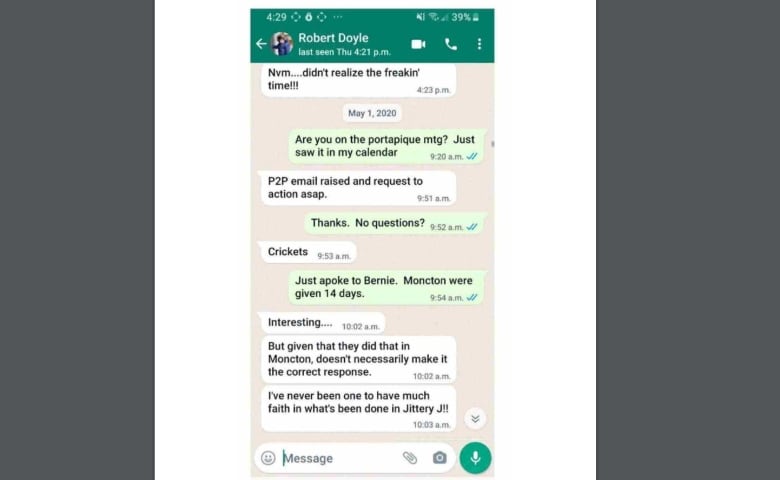Why Nova Scotia's RCMP tactical team is 'shaking mad' 2 years after Portapique tragedy
Private messages between 2 senior RCMP employees show disdain for officers who asked for support

Members of Nova Scotia's emergency response team are "shaking mad" after texts between a superintendent and a subordinate reveal they were making fun of their mental health requests in the aftermath of the Portapique tragedy.
The WhatsApp messages were released by the Mass Casualty Commission this month. The commission is examining the circumstances surrounding the events of April 18-19, 2020, when a gunman killed 22 people during a 13-hour rampage in several Nova Scotia communities.
In the exchange, Supt. Robert Doyle complains to Kelly Sullivan, the employee and management relations officer, about how the tactical unit wanted to decompress together in the office for two weeks.
He made a crude suggestion the men wanted to sit around, doing nothing.
"This is all over their wanting to circle-jerk for two weeks and not getting their way," wrote Doyle, who was one of the highest ranking Mounties in Nova Scotia and the one who oversaw employee wellness.

Cpl. Tim Mills was the response team's leader in April 2020. He retired six months later, frustrated by the internal fighting over this particular request.
"It just shows the lack of respect and the lack of trust they have in us to do our job." Mills told CBC in an interview. "It was like, 'They just want two weeks off to be lazy and do nothing at all.' That's their mindset."
The team had five full-time members and eight part-time officers at the time. As Mills and his former colleague Cpl. Trent Milton testified in May, they were upset because the full-time members were granted time together in the office, but the part-timers had to return to regular duty.
"Everyone wanted to work. But they just wanted time away from front-line policing — two weeks to decompress at headquarters," said Mills.
"That way, they're removed and let the dust settle a bit and then get back to work after they had enough time to decompress."
According to RCMP, all team members were granted two weeks of leave "once resource continuity planning was in place."
'They're shaking mad'
Now that the text exchanges have been released two-and-a-half-years later, simmering emotions have risen once again.
"From contact with current members, some did reach out to me. Again, it just brings up you know anger from before but also confirms what we believed," said Mills.
"A comment I've heard is they're shaking mad."

The text messages from Doyle also refer to how wives of team members were writing to the provincial justice minister, creating a "sh-t show."
Two of those letters were released by the inquiry, including one written by Jessica McKenna on April 29, 2020. She was a 17-year RCMP member at the time, and the wife of Andrew Ryan — a part-time member of Nova Scotia's emergency response team.
She shared her disappointment with the "tug-of-war" between her husband's team and management.
"Decisions on how to respond to these commands have caused rifts within the team as members are forced to choose how to react and with whom to ally," wrote McKenna in her letter. "The in-fighting amongst managers and the fact that no one with enough clout to get these guys two weeks of decompression has actually come forward to do so is an embarrassment."
Moncton reference
The newly released messages between Doyle and Sullivan also mention the fatal police shooting in Moncton in 2014. Officers were given two weeks off at the time.
"Given that they did that in Moncton, doesn't necessarily make it the correct response. I've never been one to have much faith in what's been done in Jittery J!!" said Doyle, referring to RCMP's J Division in New Brunswick.
In a written statement, RCMP said it's working toward a "healthy, inclusive and modern RCMP."
"The text messages are reflective of a very challenging time for the Nova Scotia RCMP. All employees, whether directly or indirectly involved in dealing with this tragic event, were deeply affected by it," Cpl. Chris Marshall said in the statement.
"Even in the most difficult times, however, all communication should reflect the core values of the RCMP."
Lack of respect
Mireille Mortimer, a lawyer who specializes in workplace culture audits, said "messages like that say a lot about workplace culture."
"It really says that there's a lack of respect and understanding for mental health issues," Mortimer said. "But also more than that, it actually shows quite a disdain for anyone that expresses any type of mental health."

In the case of the Nova Scotia team's request, documents released by the inquiry show the officers weren't immediately granted the request because it wasn't deemed medically necessary by psychologists.
Senior leaders later approved having the emergency response team together at headquarters, but that message was never passed along to the members.
"That was kind of a relatively, if I can say, a minor request," Mortimer said.
She suggests the solution comes down to intensive training at the very least.
"Whoever is in management that kind of has that sentiment, there are ways that you can try to address it," said Mortimer. "Sometimes employers just have to kind of change the actual individual, right?"
Doyle has since changed positions within the RCMP.


